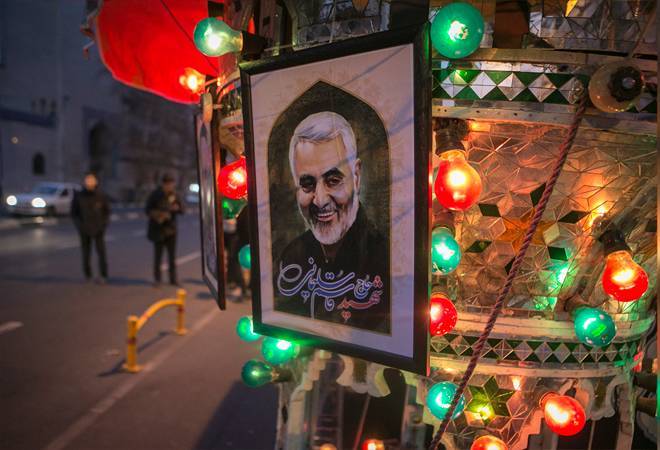Tensions between Tehran and Washington further deteriorated in early January, when top Iranian general Qasem Soleimani was assassinated in a US drone strike on his car in Baghdad.
Major General Hossein Salami, Chief Commander of Iran’s Islamic Revolutionary Guards Corps (IRGC), has urged the US to use its military for domestic purposes instead of sending it abroad.
“When the Americans are in the region, they will both harm themselves and the nations [in the region], and their existence results in nothing but the deterioration of their own power and damage to these nations”, Salami pointed out on Saturday.
He referred to an IRGC missile attack on a US airbase in January, saying that some US officials announced after the strike that they “wanted to carry out limited operations against the Iranians, which was no more than a political bluff".
Salami noted that after Washington “tested the power” of the Islamic Republic, the US “knows very well how Iran will react to any efforts to undermine it”.
He called on US officials to “really care about the lives of their people in New York and the states involved with coronavirus rather than thinking about Hollywood scenarios and killing people in Iraq”.
“Instead of deploying their troops around the world to displace people, it is better to keep their army in the United States to solve the problems of its people, like Iran, which has used its armed forces to fight the coronavirus”, Salami said, adding that from the first day of the coronavirus outbreak in Iran, Tehran used “all the capabilities of the IRGC […] to combat the virus”.
Iran has the highest COVID-19 infection rates in the Middle East and ranks sixth in the world in total infections after the US, China, Italy, Spain, and Germany.
Salami’s remarks come after he signaled on Thursday Iran’s readiness to help the US grapple with the coronavirus, adding that Tehran doesn’t need Washington’s assistance in this regard.
The statement followed Salami pledging last week that Iran will continue to respond to the US assassination of the top Iranian general in Iraq earlier this year.
“The Americans assassinated our great commander. We have responded to that terrorist act and will respond to it”, Salami said in a televised address.
Salami also commented on the economic situation in the country amid the tough US sanctions against Iran, stressing that Tehran’s enemies “have not been able to subjugate Iran through economic pressure".
Assassination of Qasem Soleimani
On 3 January, a US drone strike, authorised by President Trump, killed Soleimani and Shia militia commander Abu Mahdi Muhandis who both were in a car at the Baghdad International Airport. Washington alleged that the two men were involved in an attack on the US Embassy in Baghdad in late December.
Soleimani’s assassination led to a major escalation of tensions between Tehran and Washington, with Iran officially responding by launching airstrikes against two Iraqi military bases housing US troops.
The strikes caused no deaths or serious injuries, but the Pentagon has since reported that at least 109 US servicemembers have been diagnosed with traumatic brain injuries.
Bilateral tensions have been simmering since Trump announced Washington's unilateral withdrawal from the 2015 Iran nuclear deal, or the Joint Comprehensive Plan of Action (JCPOA), on 8 May 2019, also reinstating harsh economic sanctions against the Islamic Republic. Exactly a year later, Iran announced that it was suspending implementation of some of its obligations under the JCPOA.






